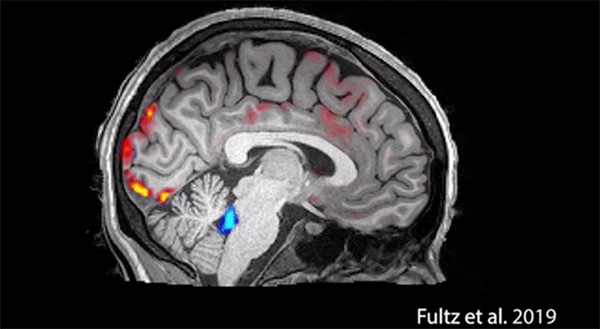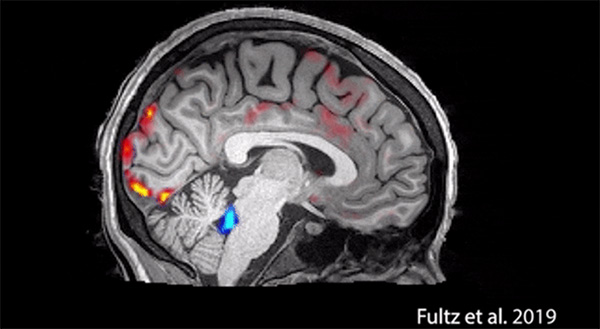This time, scientists at Boston University, for the first time, photographed the cleaning process:

Red is blood, blue is CSF. What's worse is that it has not been found before, and blood can flow out of the brain periodically. Whenever blood flows out in large quantities, CSF takes the opportunity to launch a wave of attacks.
The CSF enters and clears toxins, such as those that cause Alzheimer's disease β Amyloid protein.
And such cleaning, only after sleeping can we do, let people wake up, have a fresh brain; When not asleep, CSF does not have a full opportunity to take advantage of the emptiness.
In addition, the researchers found the relationship between EEG activity and cleaning processes, which means that brain waves command fluid movement.
This achievement has just been on science.
The author excitedly said: it is another step closer to revealing the link between Alzheimer's disease and sleep.
Maiken Nedergaard, a neuroscientist at Rochester University, was amazed at:
This paper is wonderful.
I can't imagine that someone can really prove that EEG can make the fluid flow, a rowing boat.
So, sleep a little more, don't stay up late. If you can't wash your brain, you may really become stupid.
Why can only sleep to wash the brain?
When you fall asleep, the brain goes through several different stages:
From mild sleep to unconscious deep sleep to REM sleep, it's a dream prone state.
The new study is focused on non rem, not until dreams are coming, and it is also a very important stage for memory retention.

In fact, in 2013, studies have proved that in the process of sleep in mice, the brain like β Toxins like amyloid will be removed. The cleaning agent for the brain is called cerebrospinal fluid.
The question is, how did it get rid of? Why is it only cleared when you sleep?
Scientists did an experiment in which 13 people put on brain caps and slept in an MRI machine. EEG will show which sleep state a person is in; MRI measures blood oxygen levels and shows how much cerebrospinal fluid is flowing in and out.
Then we found a wonderful phenomenon
The concentration of blood oxygen in the brain, there is a significant cycle changes. In other words, blood will flow out of the brain on a large scale and periodically.
At this time, cerebrospinal fluid will rush into the brain and fill the space left for it

After waking up, the big cycle disappeared, and cerebrospinal fluid could not rush into the brain in large quantities to complete effective cleaning

The paper's co-author, Laura Lewis, believes that this is because during sleep, neurons in the brain start to synchronize, turning on and off together.
The reason for this conjecture is that electroencephalogram data show that the circulation of blood and cerebrospinal fluid occurs only after the emergence of neural rhythm
When a large number of neurons stop firing together, it doesn't need so much blood to deliver oxygen, which gives CSF an opportunity to flow in.
In this way, we have the scene we saw at the beginning:

This discovery is very important. It tells us that sleep is a very special function
When we're awake, neurons don't turn on and off at the same time. So, there's no way to lower the blood volume of the brain to a low enough level when you're awake.
Only after sleeping, when there is not so much blood in the brain, can the cerebrospinal fluid circulate freely and clear the brain β Amyloid is a byproduct of metabolism.
Even Maiken Nedergaard, a neuroscientist at the University of Rochester, who led the 2013 mouse study, praised it
This paper is wonderful.
It's totally unexpected that someone can really prove that EEG activity can make fluid flow, a rowing boat.
Next step research
According to Bryce a Mander's paper in nature, aging and local brain atrophy are associated with decreased slow wave activity during non rapid eye movement (NREM) sleep.
Link to the paper: https://www.nature.com/articles/nn.3324
This study points out that sleep interruption in the elderly is caused by changes in brain structure, which can lead to age-related cognitive decline.
Now, this new development at Boston University suggests that slow wave loss is associated with decreased CSF flow.
Next, they will continue to explore how aging affects the flow of blood and cerebrospinal fluid during sleep.
According to Lewis, the team plans to recruit older people for the next study.
Another problem in the process of research is how brain waves, blood and cerebrospinal fluid cooperate perfectly. Lewis said:
We observed that neurological changes always seem to occur first, followed by blood flow from the brain, after which CSF fluctuations occur.
The deepening of this research also opens up new treatment ideas for the treatment and prevention of neurological diseases such as Alzheimer's disease and autism.
Previously, for β The drug development of amyloid protein is frequently in trouble, but now, scientists point out that it may be an effective solution to focus on increasing the amount of cerebrospinal fluid for "brainwashing" instead of focusing on the specific molecules that work.
Led by female scientists
The corresponding author of this science paper is Laura Lewis, assistant professor of Biomedical Engineering at the school of engineering, Boston University.
In 2014, she graduated from MIT with a Ph.D. in neuroscience. His research interests include brain imaging, neurodynamics, computational neuroscience and signal processing.
The first paper was written by Nina fultz, a member of Lewis laboratory.
Interestingly, most of the 10 members of Lewis lab are women.
